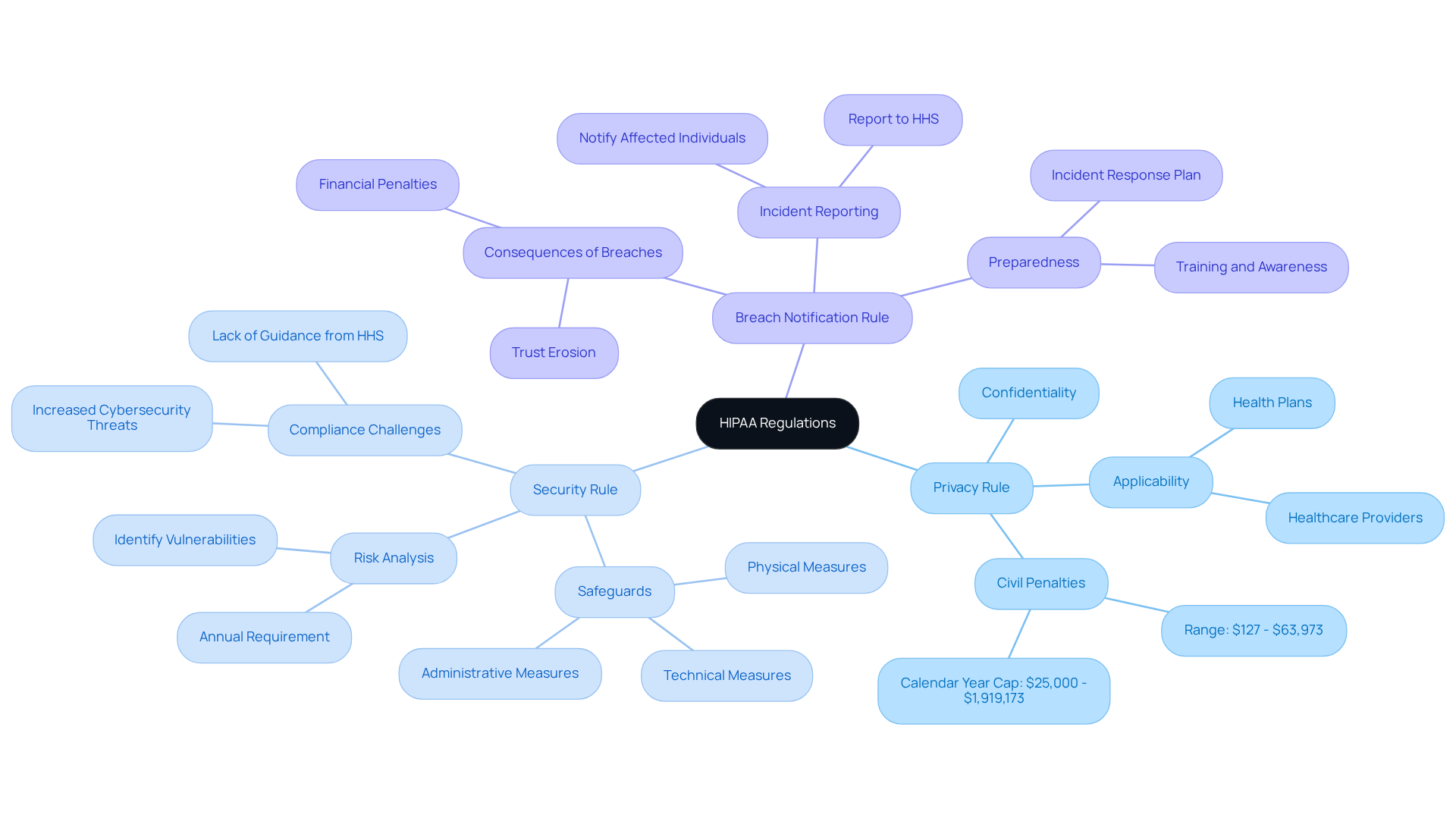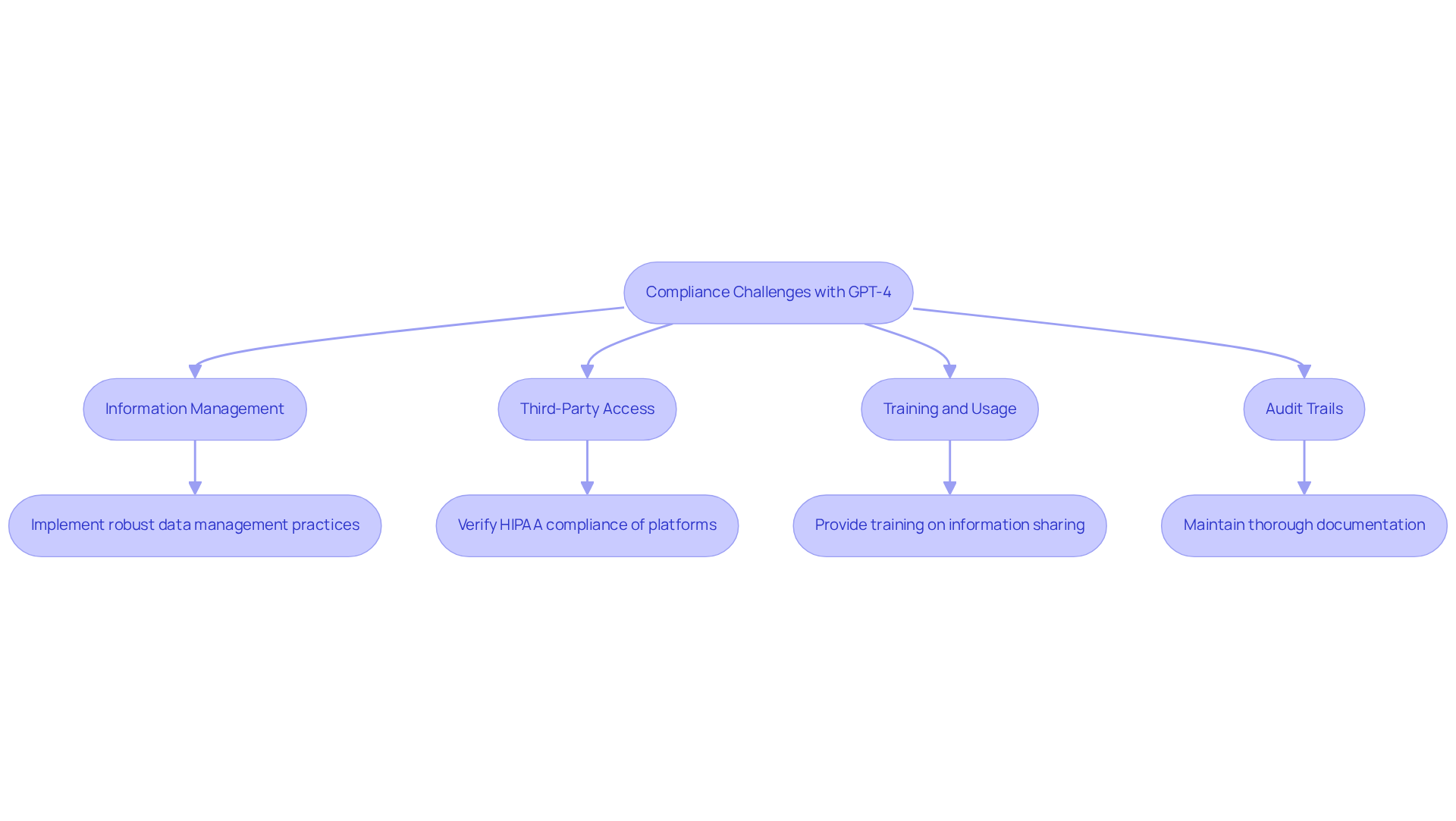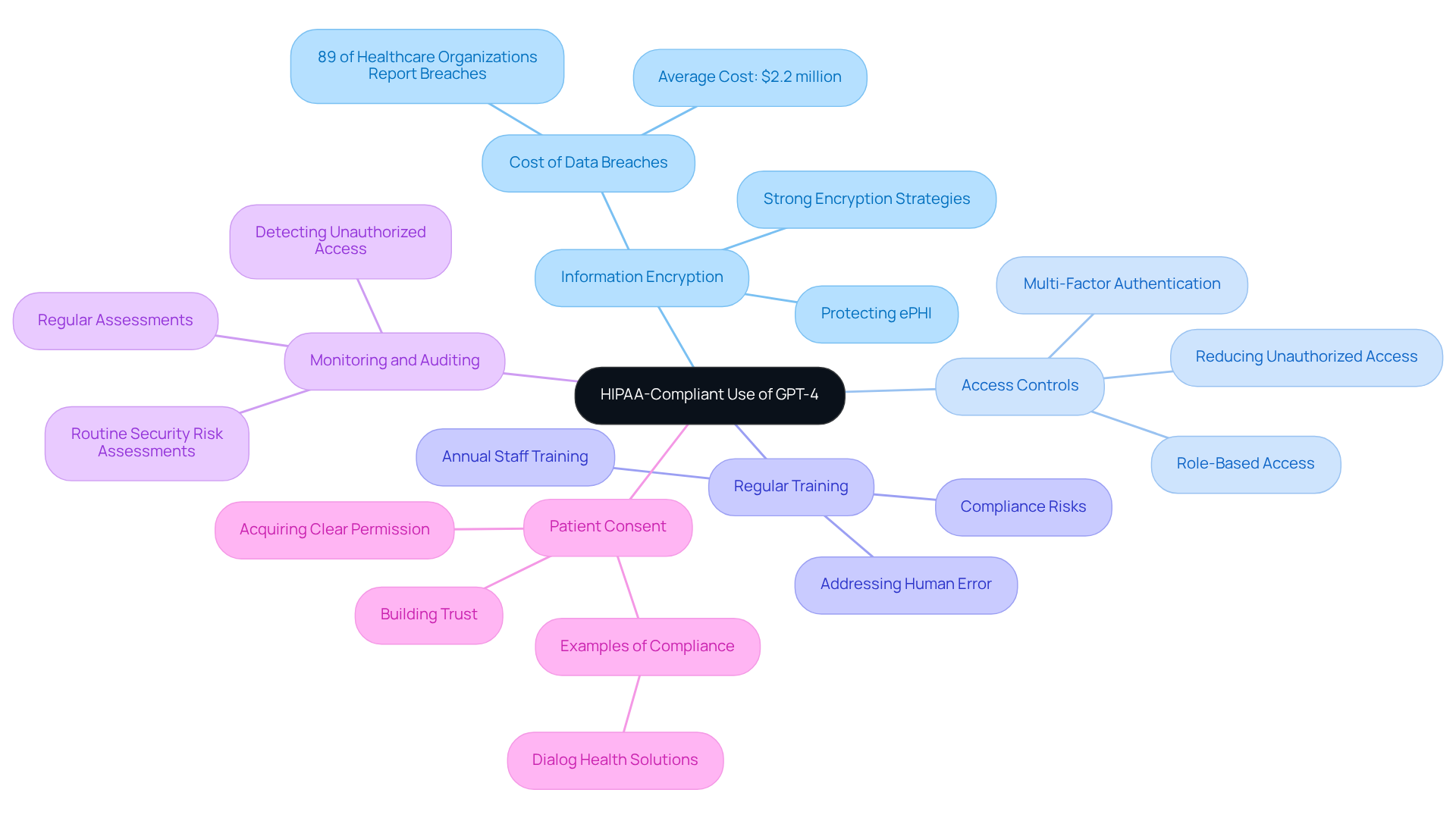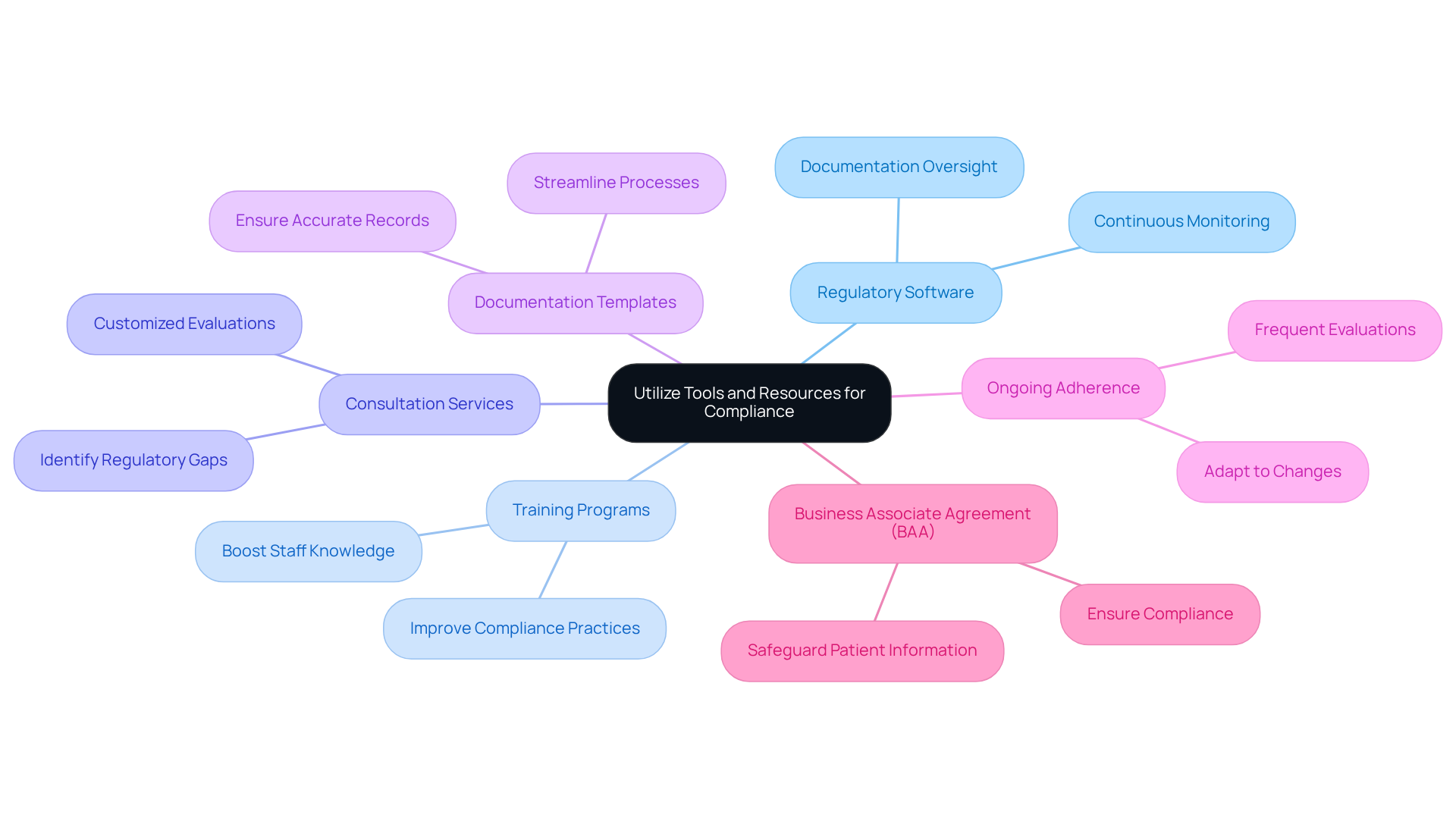Overview
Healthcare providers face significant emotional challenges in ensuring GPT-4 HIPAA compliance. The weight of administrative burdens can often feel overwhelming, impacting the quality of patient care. To navigate these complexities, it's essential to implement key practices such as:
- Robust data management
- Training on privacy regulations
- Maintaining strict access controls
Continuous education is vital. By fostering a culture of learning, healthcare providers can empower their teams to stay informed about privacy regulations and compliance challenges. Utilizing specialized tools can also ease the burden, helping to safeguard patient information effectively.
Imagine the peace of mind that comes from knowing patient data is secure. This not only fosters trust in healthcare settings but also enhances the overall patient experience. We encourage you to explore these practices further and consider how they can be integrated into your organization. Together, we can create a safer and more compassionate healthcare environment.
Introduction
Navigating the intricate landscape of HIPAA regulations can feel overwhelming for healthcare providers. As you strive to integrate advanced technologies like GPT-4 into your practice, the emotional weight of ensuring compliance with the Privacy, Security, and Breach Notification Rules can be daunting. It’s essential to safeguard patient information while harnessing the power of AI. But how can you effectively ensure that your use of GPT-4 aligns with HIPAA standards amidst ever-evolving regulatory demands?
This guide aims to illuminate your path to compliance. We will offer actionable insights and best practices designed to empower you as a healthcare professional. Embracing innovation doesn’t have to compromise patient trust; instead, it can enhance the care you provide. Together, let’s explore how you can navigate these challenges with confidence and compassion.
Understand HIPAA Regulations and Requirements
To ensure compliance with HIPAA (Health Insurance Portability and Accountability Act), healthcare providers must familiarize themselves with several key regulations that can feel overwhelming:
-
Privacy Rule: This rule establishes national standards for the protection of health information, mandating that patient information remains confidential and is only shared with authorized individuals. While a significant majority of healthcare providers are aware of the Privacy Rule, many still struggle with its practical application in daily operations. How can we bridge that gap?
-
Security Rule: This rule outlines the necessary safeguards to protect electronic health information, including administrative, physical, and technical measures. The lack of definitive guidance from the HHS has left many organizations vulnerable, highlighting the urgent need for robust internal security practices. What steps can you take to enhance your security measures?
-
Breach Notification Rule: In the event of a security incident, providers are required to inform impacted individuals and the Department of Health and Human Services (HHS). With thousands of health information privacy violation cases reported each year, understanding the implications of this rule is essential for maintaining trust and adherence. Are you prepared to handle such incidents?
Grasping these regulations is crucial for any provider aiming to incorporate advanced AI into their practice, particularly to ensure that it is gpt 4 hipaa compliant, which guarantees that patient data stays secure and confidential throughout its use. Case studies have shown that organizations applying thorough training and risk evaluations substantially decrease their susceptibility to breaches, emphasizing the significance of continuous education in regulatory adherence. Let’s commit to ongoing learning and support each other in navigating these challenges together.

Identify Compliance Challenges with GPT-4 in Healthcare
Integrating GPT-4 into healthcare practices can feel daunting, as it presents several compliance challenges that providers must navigate with care:
-
Information Management: The model's ability to handle extensive volumes of information, including confidential patient details, necessitates strict adherence to privacy regulations. It’s vital for providers to implement robust data management practices to protect patient privacy and ensure compliance.
-
Third-Party Access: When utilizing the model through external platforms, it’s crucial to verify that these platforms meet HIPAA standards. This includes ensuring that Business Associate Agreements (BAAs) are in place to govern the use of Protected Health Information (PHI).
-
Training and Usage: Providing sufficient instruction for personnel on the proper utilization of the model is essential. This training should cover what information can be shared and the protocols for managing sensitive information, thereby minimizing the risk of unintended disclosures. Specialized support tailored to the healthcare industry's unique dynamics can significantly enhance training effectiveness.
-
Audit Trails: Maintaining thorough documentation and audit trails of all interactions with the system is essential for compliance and accountability. This practice supports regulatory requirements and enhances transparency in data handling processes.
By proactively addressing these challenges, healthcare providers can mitigate risks and ensure that their implementation of advanced AI is gpt 4 hipaa compliant. This not only fosters trust but also safeguards patient information, ultimately allowing providers to focus on what truly matters: delivering compassionate care.

Implement Best Practices for HIPAA-Compliant Use of GPT-4
To ensure HIPAA-compliant use of GPT-4, healthcare providers are encouraged to adopt the following best practices:
-
Information Encryption: Encrypting sensitive patient information both in transit and at rest is vital for safeguarding electronic protected health information (ePHI) from unauthorized access. This proactive measure can significantly lessen penalties in the event of a security breach. Consider this: the typical expense of information breaches in healthcare is approximately $2.2 million, and an astonishing 89% of healthcare organizations reported breaches. Strong encryption strategies are crucial for protecting patient information.
-
Access Controls: Implementing strict access controls, including multi-factor authentication and role-based access, ensures that only authorized personnel can access the system and the information it processes. Robust access controls are essential for reducing exposure to sensitive information and improving overall information security.
-
Regular Training: Conducting yearly training sessions for staff on privacy regulations is essential to ensure the proper use of GPT-4, especially since it is GPT-4 HIPAA compliant. Continuous education addresses the significant factor of human error in data breaches. Organizations that fail to provide adequate training risk noncompliance and potential fines, as evidenced by the OCR's enforcement actions. As Dan Lebovic, Senior Regulatory Attorney, wisely states, "Even organizations not governed by the health information privacy regulations must prioritize patient privacy concerns."
-
Monitoring and Auditing: Regularly observing and assessing the use of the model helps ensure adherence to HIPAA regulations and identify any potential breaches. Proactive monitoring can help detect unauthorized access attempts and ensure that security measures are effectively implemented. Furthermore, performing routine security risk assessments is essential for ensuring compliance and recognizing vulnerabilities.
-
Patient Consent: Acquiring clear permission from patients prior to utilizing their information with the AI model is a practice that guarantees adherence to regulations. This approach encourages openness and fosters trust between healthcare providers and patients. For instance, Dialog Health has successfully implemented HIPAA-compliant engagement solutions that emphasize the importance of patient consent.
By adhering to these optimal methods, healthcare providers can harness the features of advanced AI while ensuring alignment with privacy regulations. This commitment ultimately enhances patient data security and builds trust, fostering a more compassionate healthcare environment.

Utilize Tools and Resources for Compliance
Healthcare providers often face emotional challenges in navigating HIPAA compliance while striving to deliver the best patient care. The administrative burdens can feel overwhelming, impacting their ability to focus on what truly matters—their patients. By leveraging various tools and resources, providers can alleviate some of this stress and enhance their compliance efforts with GPT-4.
-
Regulatory Software: Implementing regulatory management software is essential for effectively monitoring health information privacy obligations. Platforms such as Vault and Drata offer extensive functionalities that ensure continuous adherence and documentation oversight. This assistance can significantly lighten the administrative load and reduce the chance of errors, allowing providers to concentrate more on patient care.
-
Training Programs: Participating in online training programs tailored for HIPAA regulations can significantly boost staff knowledge and confidence. Studies show that participants in such programs report a notable increase in their ability to handle sensitive information and understand data security protocols. This leads to improved adherence practices, fostering a culture of compliance.
-
Consultation Services: Engaging advisors who specialize in healthcare can provide customized evaluations of your practices. These specialists can pinpoint regulatory gaps and suggest methods to align your operations with HIPAA regulations. Seeking professional technical guidance before implementing solutions ensures compatibility and effectiveness, supporting your team in their compliance journey.
-
Documentation Templates: Utilizing standardized templates for documentation and audit trails is vital for maintaining necessary records. These templates streamline the documentation process, ensuring that all compliance-related activities are accurately recorded and easily accessible during audits, reducing anxiety around compliance checks.
-
Ongoing Adherence: Recognizing that adherence is an ongoing process is crucial. Frequent evaluations and revisions of practices are essential to adapt to the ever-changing regulatory environment, allowing providers to stay ahead of challenges.
-
Business Associate Agreement (BAA): When selecting services related to health information privacy, ensure a signed Business Associate Agreement (BAA) is in place. This agreement is fundamental for upholding regulations and safeguarding patient information, providing peace of mind.
By effectively utilizing these tools and resources, healthcare providers can strengthen their compliance efforts and ensure that GPT-4 is HIPAA compliant. Together, we can navigate these challenges and focus on what truly matters—caring for our patients.

Conclusion
Navigating HIPAA compliance while integrating advanced technologies like GPT-4 in healthcare can feel overwhelming. Healthcare providers often face emotional challenges as they strive to protect patient information amidst the complexities of regulations. It's essential to understand that by mastering the core elements of the Privacy, Security, and Breach Notification Rules, providers can safeguard patient data and maintain the trust that is so vital in today’s healthcare environment.
The article outlines key strategies to tackle compliance challenges associated with GPT-4. Consider the following foundational practices:
- Robust information management
- Strict access controls
- Regular staff training
Utilizing tools like regulatory software and consultation services can help streamline compliance efforts, allowing you to focus more on patient care rather than administrative burdens. Best practices such as encrypting sensitive data and maintaining thorough audit trails not only enhance compliance but also demonstrate a commitment to upholding patient privacy.
Ultimately, embracing GPT-4 in healthcare opens up opportunities for enhanced patient care, but it must be approached with a strong foundation of compliance. By adopting the best practices discussed and leveraging available resources, you can meet regulatory requirements while fostering a culture of trust and security within your organization. Remember, the journey toward effective HIPAA compliance is ongoing. By prioritizing education and proactive measures, you can navigate the complexities of AI technologies, ensuring that patient care remains at the heart of your mission.




